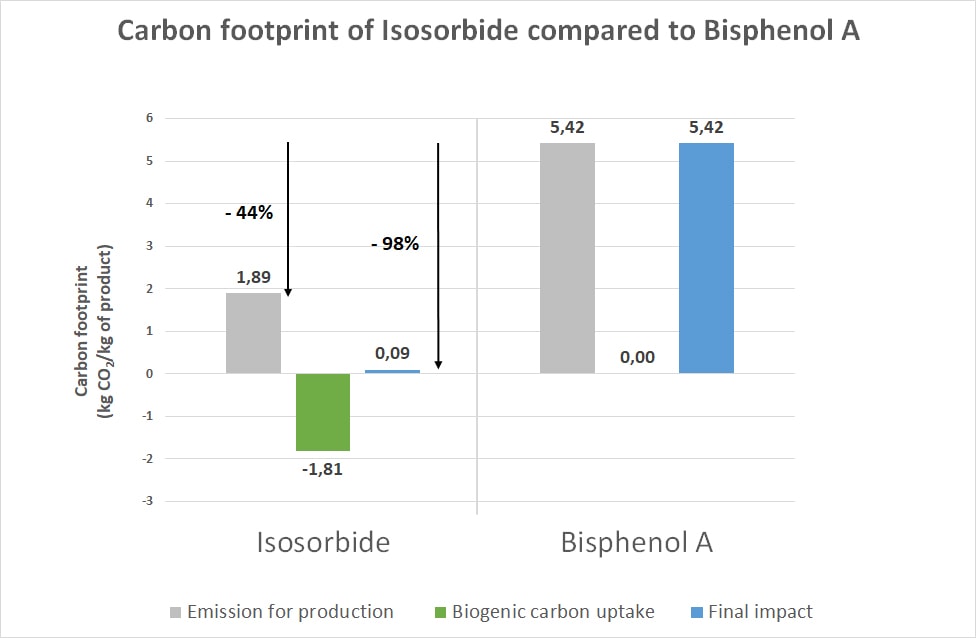 Improving performance through plant-based innovations is a key market trend, and this is exactly what Roquette delivers. As a key provider, Roquette offers the polymer markets innovative and sustainable monomers to create solutions for safer and more sustainable polymers.
Improving performance through plant-based innovations is a key market trend, and this is exactly what Roquette delivers. As a key provider, Roquette offers the polymer markets innovative and sustainable monomers to create solutions for safer and more sustainable polymers.
POLYSORB® is a high purity 1,4:3,6-dianhydro-D-glucidol, more commonly called isosorbide. This sustainable, biodegradable, non-aromatic and bicyclic diol is obtained by dehydration of sorbitol, a derivative of starch, for which Roquette is the leading world producer.
Roquette started to produce isosorbide in 2002 in Lestrem, France, to serve the pharmaceutical market as an osmotic diuretic and as a cure for heart problems. Thanks to the work done to meet the pharmaceutical purity standards, the high level of purity required for performance materials applications was achieved at industrial scale. In 2007, the company started the commercial production of POLYSORB® isosorbide as a building block for polycondensation polymers. In these application domains, the absolute purity of POLYSORB® isosorbide helps improve materials performance, while keeping good color and using a safe monomer. Roquette first extended our plant in 2011 and again in 2015 to become the world’s largest isosorbide plant.
This versatile ingredient differentiates itself from any grade of isosorbide on the market as it is a highly pure grade, with outstanding qualities and functionalities. It clearly improves the performance of polycarbonates, polyurethanes, polyesters and epoxides in different markets such as the packaging, automotive, and coatings and adhesives markets.
The high purity of POLYSORB® is not the only reason for its efficiency in the performance materials field; it is a very well stabilized product allowing good use in highly demanding polymerization processes. Thanks to the collaboration with customers and the work of technical teams within Roquette, POLYSORB® has been fine-tuned to each application, resulting in a range of tailor-made grades adapted to customers’ needs.
Let’s have a closer look about how it answers customers’ and consumers’ needs.
In the case of PET for packaging, POLYSORB® answers customers’ needs in terms of performance material all along the chain of its use: easy to proceed, convenient to apply by brand owners and reliable to use by consumers as a safe and recyclable product. Its main advantages in PET for packaging are to offer a flexible design and clear transparency while enhancing heat resistance. POLYSORB® has a large range of uses such as sport bottles, cosmetic packaging, hot-fillings and pasteurization. POLYSORB®-based PET has good chemical resistance performance, and you can fill bottles with hot water and microwave your food packaging. POLYSORB®-based semi-crystalline PET has full compatibility benefits with PET recycling systems. This makes it a material of choice for beverage and cosmetic packaging.
When it comes to polycarbonate for automotives, POLYSORB®-based PC answers the need for a lightweight solution with good durability and appearance for interior and exterior parts. It could also be highlighted as a substitution of glass. Its main advantages in polycarbonate for automotives are good scratch resistance, good optical properties, high gloss and a paint-less process. It is also considered for outdoor applications thanks to its UV resistance under sun exposure.
For coating and adhesives, POLYSORB®-based solutions answer the need to reduce VOC (Volatile Organic Compounds) during the product’s use. Its main advantages in polyurethane or epoxy are good adhesion to different surfaces especially metal, and it has good surface properties in the final coating. POLYSORB® also allows higher adhesion to metal substrates than classical 1,4-BDO.
Of course, the use of POLYSORB® can be extended to other applications as a plasticizer, in direct contact with end-users such as in hospital floorings, decorative indoor surfaces, school furniture, etc.
This complete range of POLYSORB® answers customers’ and consumers’ needs in terms of performance, sustainability and safety as it is non-toxic and free of bisphenol A (BPA) and any bisphenols, and phthalates. It is REACH and FDA compliant and has proven not to be an endocrine disruptor thanks to in vitro testing handled by the Institut Pasteur.
POLYSORB® also improves the carbon footprint versus other molecules such as BPA with less emissions and biogenic carbon* uptake.
Internal comparative study based on LCA methodology, which was peer reviewed by an external auditor.

*Biogenic carbon: Carbon retained by a plant during its development.
Source
Roquette, press release, 2019-12-06.
Supplier
Share
Renewable Carbon News – Daily Newsletter
Subscribe to our daily email newsletter – the world's leading newsletter on renewable materials and chemicals









